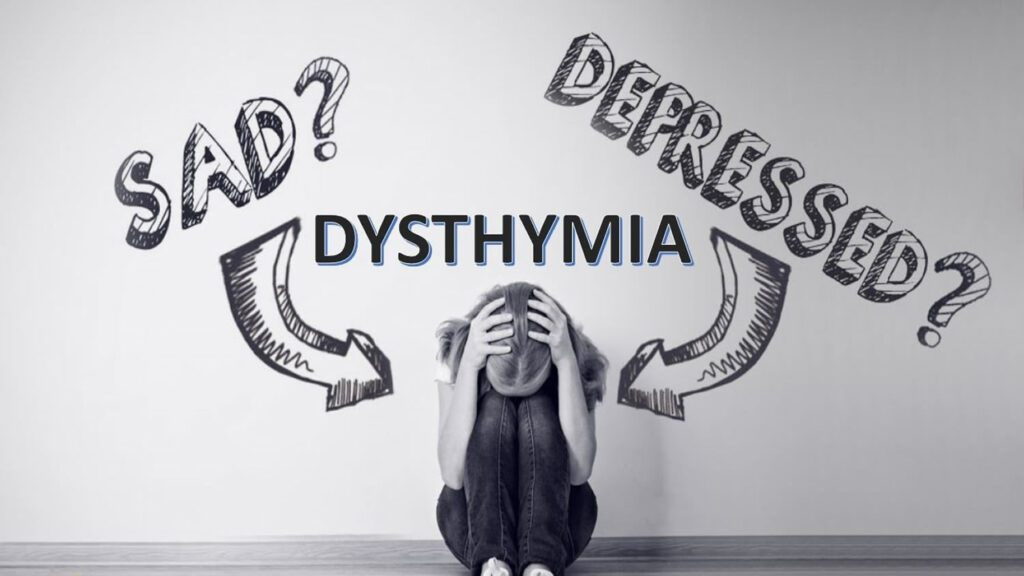Dysthymia is a mood disorder that is characterized by long-term, low-grade depression. It can be very difficult to deal with, as it can often make you feel like you are stuck in a rut and unable to break out of it. In this comprehensive guide, we will discuss everything you need to know about dysthymia: its symptoms, causes, and treatment options. We hope that this information will help you better understand this disorder and find the best treatment plan for you or your loved one.
What is Dysthymia?

Dysthymia is a mood disorder characterized by chronic low mood which lasts for more than two years. Symptoms of dysthymia include a lack of interest in activities, feeling tired all the time, poor concentration, and difficulty making friends. Dysthymia often co-occurs with other mental health disorders such as anxiety and depression.
Dysthymia is more common in women than men and it mostly affects adults aged 20 to 59. However, there is a growing population of dysthymic people in young adulthood as well. This can be caused by several factors including genetics, brain chemistry, environmental factors (stressors), and lifestyle choices. There is currently no cure for dysthymia but treatments can help manage symptoms.
If you think you may have dysthymia, please consult your doctor.
Symptoms of It
Dysthymia can persist for months or years and can have a serious impact on everyday life. There is no single cause of this, but it is often triggered by stress or traumatic events. Dysthymia is considered a chronic condition, meaning that it tends to last for longer than six months.
Symptoms of dysthymia vary from person to person, but some common symptoms include:
Chronic low mood: This is one of the most common symptoms of this. People with dysthymia often experience a feeling of sadness or gloom for prolonged periods, even when things are going well.
Lack of energy: People with dysthymia often feel lethargic and have little energy to do anything.
Decreased interest in life: People with this may find that they lose interest in activities that used to be enjoyable, such as spending time with friends or going out partying.
Persistent feelings of pessimism: People with dysthymia often feel that the world is a bleak and hopeless place and that there is no point in trying to do anything.
Low self-esteem: One of the most common symptoms of dysthymia is a feeling of low self-esteem. People with dysthymia often feel that they are not good enough and that they cannot accomplish anything.
Apathy or lack of interest in life: Another thing that can happen is that people with dysthymia lose interest in things that used to be enjoyable, such as spending time with friends or going out partying. They may become withdrawn and isolate themselves from the world.
If you are experiencing any of these symptoms, please consult your doctor. There is no specific treatment for dysthymia, but medications like antidepressants may help relieve symptoms. If left untreated, dysthymia can lead to significant psychological and physical complications.
Causes of Dysthymia

Dysthymia is a relatively common mood disorder characterized by persistent low mood, diminished self-esteem, and decreased energy. Aso, Dysthymia can be caused by a variety of factors, including environmental factors (such as stress or lack of support), genetic factors, and hormonal changes. Dysthymia is often accompanied by other Mood Disorders, such as Bipolar Disorder or Depression, but it can also occur alone. There is no definitive cause of dysthymia, but the condition is typically the result of multiple factors working together.
Some of these causes of dysthymia include:
Environmental factors – Dysthymia can be caused by stress or a lack of support from loved ones. These environmental changes can lead to a decrease in self-esteem and an overall feeling of sadness or emptiness.
Genetic factors – This is often passed down from parents to their children and may be due to a genetic weakness or variation. This means that dysthymia is not always preventable, but it can be treated with medication and therapy.
Hormonal changes – Dysthymia may occur during the menstrual cycle or in the aftermath of menopause. These hormonal changes can lead to feelings of melancholy and decreased energy.
Psychological factors – Dysthymia may be the result of a psychological issue, such as anxiety or depression. If left untreated, these psychological issues can lead to dysthymia.
Other medical conditions – Dysthymia can be a sign of another medical condition, such as heart disease or thyroid problems. If you are experiencing dysthymia and have any other concerns, please consult your doctor.
Treatment for It
Dysthymia is a mental disorder marked by chronic sadness, pessimism, and low self-esteem. While dysthymia is not always life-threatening, it can significantly interfere with daily living and can be very difficult to treat. There are several different treatments available for dysthymia, but the most effective approach depends on the individual’s specific symptoms and needs.
Some of the most common treatment options for dysthymia include medication, therapy, stress management, and self-help strategies. Medication is typically the first line of treatment for dysthymia and can help relieve symptoms such as depression, anxiety, and fatigue. Therapy can help patients learn how to cope with their feelings and develop healthy coping mechanisms. Stress management techniques can help reduce anxiety and stress levels, which may in turn help improve symptoms of dysthymia. Self-help strategies, such as mindfulness meditation or cognitive behavioral therapy, can also help treat dysthymia.
While there is no cure for dysthymia, treatment options are available that can help improve symptoms and quality of life. If you are experiencing significant problems due to dysthymia, it is important to talk to your doctor about the available treatments.
Conclusion
If you’re anything like me, you’ve struggled with dysthymia at some point in your life. Dysthymia is a condition that makes it hard for someone to feel good about themselves. It can make it difficult to enjoy life and can lead to low self-esteem and feelings of sadness and hopelessness. If you or someone you know is suffering from dysthymia, please know that there is help available. There are treatments available that can restore mental health and well-being, so don’t give up on yourself just yet.
Hope this article was of help to you! If you are suffering from seasonal depression, you may seek help from Therapy Mantra. We have a team of highly trained and experienced therapists who can provide you with the tools and skills necessary for overcoming seasonal depression. Contact us today to schedule an online therapy or download our free Android or iOS app for more information.


